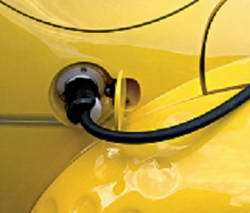The end of cheap gas: U.S. automakers are running on empty

The federal government recently acknowledged that the era of cheap gas has come to an end. Now it's high time that U.S. automakers did the same, says University of Michigan auto industry expert Walter McManus.
This month, the U.S. Energy Information Administration released projections that reveal dramatically higher world oil prices, with a new floor of $2 a gallon for gas.
"This is the first significant increase in EIA's forecast of oil prices in years," said McManus, director of the U-M Transportation Research Institute's Automotive Analysis Division. "It is time for our automakers to accept this reality—something foreign competitors have understood for years."
McManus says that in response to escalating profit losses and plunging market share, General Motors, Ford and DaimlerChrysler have begun to "restructure" their North American production capacity. But these plans, he says, do not appear to involve retooling factories or redesigning assembly lines to build fuel-efficient cars.
"GM nor Ford is expected to reduce their large SUV or pickup capacity," he said. "In fact, GM is betting its recovery on its redesigned large SUVs and pickups, in part because that investment decision was made years ago.
With gasoline prices 50 percent higher than just three years ago, consumers are increasingly turning to fuel-efficient cars and to foreign competitors. If ailing automakers are to successfully restructure their business, they must do what the EIA has done—acknowledge the end of cheap oil and retool their plants to build products that will sell in this new era."
According to McManus, the EIA predicts that a dramatic increase in the price of oil worldwide will result in improved fuel economy in light vehicles over the next 20 years.
But McManus says the "improvement" is only expected to amount to "a paltry two miles per gallon for new vehicles and an even more paltry one mile per gallon for all vehicles on the road."
He says that with 230 million vehicles on the road today and annual new vehicle sales of 16 million to 17 million, it will take big jumps in new-vehicle fuel economy to make an impact on the fuel economy of all vehicles on the road.
"And it is the fuel economy of all vehicles on the road that determines how much oil we consume, McManus said. According to the EIA, 'greater penetration by hybrid and diesel vehicles and slower growth in the sales of light trucks and sport utility vehicles' will save only the equivalent of two-and-a-half weeks of fuel."
"The real question is what kind of fuel economy does America need to achieve real reductions in fuel consumption by 2025? The real answer is a lot more than the EIA currently projects."
McManus' views on the EIA's Annual Energy Outlook and significant issues affecting the North American and global auto industry, can be found on his blog: www.hybridcars.com.
Source: University of Michigan


















